#we're going into labyrinth and james bond in this one fellas
Text
Daniel LaRusso: A Queer Feminine Fairytale Analysis Part Two of Three
Part 1
Part 3
6. Sexual Awakenings part 1: Love, Obsession, & Size Differences
[Insert that post talking about the creators making sure that Daniel’s antagonists were much bigger than him so that the audience would sympathise, spawning 10000 size kink fics]
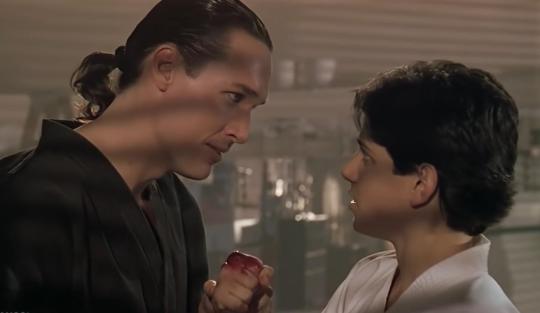
I’m sure this won’t awaken anything in Daniel
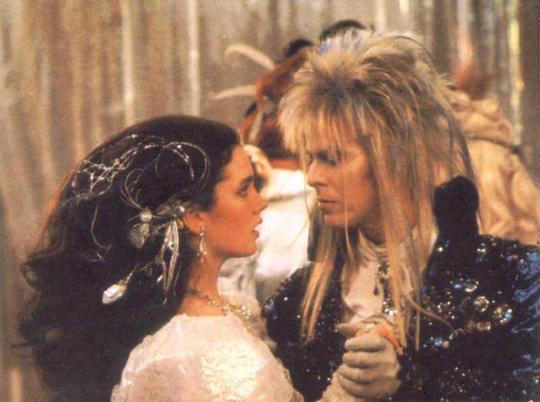
Corporate wants you to find the difference between these two pictures
The hallmark of feminine fairytales tends to be growing into womanhood, with all those symbolic sexual under/overtones, searching for a prince, encountering monsters (or evil stepmothers), on the surface tending to be quite passive/reactive, but actually being about young girls and women getting out of their environment and choosing to tussle with those deep, dark desires – monsters. They’ve got to function within the limitations of power that they have – escaping an abusive situation through marriage, chasing forbidden desires under the guise of duress, asking questions about sexuality through things like symbolic plucking (flowers) or consumption (fruit) or pricking (needles), etc.
Daniel isn’t striking out to find his fortune or win a girl or a kingdom Like A Man, he’s not a threat to Silver, who – like Jareth in Labyrinth – is in control for almost the whole of the narrative, he’s not actually able to do much more than react until he makes the decision to stop training, and even then he’s immediately ganged up on and assaulted, needing to be saved by Miyagi while he stands and watches, bloodied and bruised.
Daniel’s journey in the third movie is to be forced into an impossible situation, seduced by Silver, and then prove that whatever violence Silver did to him isn’t enough to destroy him. It is incredibly similar to Sarah’s in Labyrinth, who by the end declares: “you have no power over me,” and that’s her winning moment. Not strength, not wits, not a direct fight, (although Daniel does fight Barnes and gets beat up again – only winning in in the end by taking him by surprise, unlike in TKK1 or TKK2 where you could argue that he proves himself to be a capable physical opponent to Johnny and Chozen), but by declaring that whatever power was held over her is now void.
Daniel’s narrative isn’t satisfying in the same way, because the dynamic of Silver and Daniel only accidentally emulates this - it’s not an intention on the side of the film-makers.
When Miyagi tells Daniel that he has strong roots, when he tells him not to lose to fear and Daniel wins over Barnes (in an almost fairytale-esque set of events), on paper he’s defeated whatever hold Terry Silver has over him. In the film itself though, Daniel never defeats Silver (which will likely be confirmed once he returns in Season Four). Daniel cannot simply say “you have no power over me,” and see Silver shattered into glass shards.
The film is a contradiction: It wants to be a masculine sports film, but it exists in the same realm as Goblin Kings seducing young girls with the promise of: “Just fear me, love me, do as I say, and I will be your slave.” Unlike Sarah, Daniel doesn’t claim the power that’s been promised to him on his own terms. His subtextually sexual awakening is so corrupted that all he can do is pretend it never happened.
Still, Daniel proves in the film that his strength is not in his fists. It’s in his praying to the bonsai tree that’s healed despite a violent boy brutally tearing it in two.

These looks on Daniel and Silver though?
So why does Silver become obsessed with him? What’s up with all those red outfits (that he doesn’t wear in Cobra Kai)? What does the temptation reveal about Daniel? How does it recontextualise TKK1 and TKK2? Is Daniel bisexual? (yes).
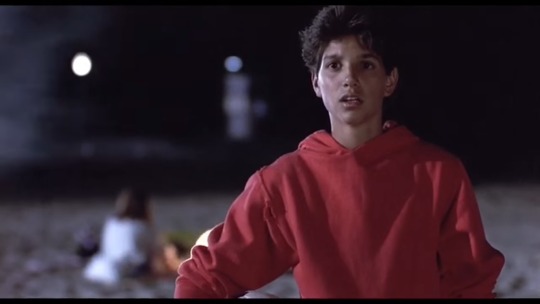
Ah, beach-Daniel, in your red hoodie and your cut-off jorts. Iconic hot-girl summer vibes.
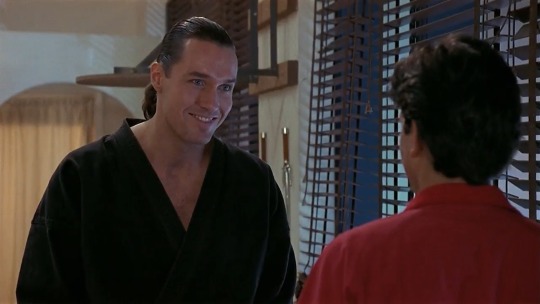
If you didn’t want me over-analysing this, you shouldn’t have put him in so many red outfits and then have this man leering at him like he wants to eat him alive.
Surface-level it’s not hard to read into a Dude Story: Masculine power fantasies are about strength in a very direct way. Fighting, control, suaveness – and if you’re not the most traditionally masculine of guys, asserting dominance through being a good lover or intelligent or overcoming that unmanliness in some way through beating the bully or convincing the hot girl to go out with you, levelling up in coolness. Being A Man. It’s not too dissimilar from Daniel’s arc in the first movie, if you watch it without taking later events into account, although Daniel is never interested in proving himself as a man, and more in making Miyagi proud. Still, he does win and gain respect, and arguably “get the girl,” although Ali’s interest in him was never dependent on the fight.
7. Sexual Awakenings Part 2: Sexual Assault, Liberation, and Queerness
Feminine power fantasies are often about sex. Metaphorically. More accurately it’s “owning sexuality.” Even more accurately: “Freedom.” They also inhabit a fluid space in which empowerment through monstrous desires and non-consent can happen at the same time. And on top of that, many of these “fantasies” are actually being written by men, so whose fantasy is it really? A lot of them are based in oral traditions so presumably they were originally from the mouths of women, even if modern iterations (starting with Grimm’s collections) are filtered through cis men’s perspectives.
All of that being acknowledged: In Angela Carter’s “The Company Of Wolves,” Red Riding Hood unambiguously sleeps with the wolf. Belle discovers her freedom from expectations and unsuitable suitors (and in some versions, evil stepsisters) by falling in love with a Beast (the original novel was written by a woman, the 18th century Gabrielle-Suzanne Barbot de Villeneuve). Jareth informs Sarah of his obsessive devotion to her in Labyrinth. To lean into horror for a moment – Buffy is stalked and eventually has relationships with both Angel and Spike, Lucy in Coppola’s Dracula (which I have mixed feelings about) is raped by the werewolf and Mina is stalked by Dracula, The Creature Of The Black Lagoon kidnaps Kay (the lead’s girlfriend) – subverted in both The Shape Of Water in which Eliza forms a consensual relationship with the amphibious sea-god and in the short-lived horror series Swamp Thing, in which the connection is purposefully framed as seductive…
and in The Karate Kid Part Three Daniel LaRusso punches a board until his hands bleed because an attractive, older man tells him to and in this moment he gives in to what he (thinks he) wants.
Not all of those examples are equal. Some are consensual, some are hinted as abusive and/or stalkery, all of them have large age gaps, and a few are outright non-consensual.
But they’re all fantasies.
They’re all power-fantasies.
Except for Daniel, because he’s a man and the idea that being obsessed (lusted) over by an older man who keeps you in his thrall, specifically because you tickle his fancy for whatever reason, because you’re beautiful, breakable, different – could in any way be considered empowering is a difficult concept to wrap your head around. It doesn’t contain that “but I’m a good girl, I’d never go off the path and pluck flowers if a bad wolf told me to, honest,” societal context or the social context of rape culture. It’s closest comparison is closeted (perhaps even unknown until that point) queer identity.
There have recently been some comparisons of Daniel LaRusso to Bruce Bechdel in Funhome (and everyone who says that Ralph Macchio ought to play him in the upcoming movie: you’re right and I’m just not going to enjoy it as much without him). I’ve written a post about Sam being the heir to his legacy and trauma, specifically as a queercoded man. It’s not dissimilar to the plot of Funhome in a lot of ways.
The other interesting source that’s been going around in connection with Daniel is the essay “The Rape of James Bond,” which discusses the use of sexual assault as a plot device for women and not for men: “About one in every 33 men [in the US] is raped. … [your statistically average, real life man] … doesn’t have a horde of enemies explicitly dedicated to destroying him. He doesn’t routinely get abducted, and tied up. Facing a megalomaniac psychopath gloating over causing him pain […] is not the average man’s average day at the office.” That last bit is just a descriptor of Terry Silver, (although I take issue at the blasé use of psychopath).
The two part youtube essay Sexual Assault of Men Played for Laughs posits that there is nothing more de-masculinising than the threat of sexual assault and therefore any narrative that features this “rightfully” must mock any man who has been a victim or who fears being a victim of sexual assault. It is feminising. There is nothing more humiliating – and therefore unheroic – than a man dealing with sexual assault.
So what do we feel when we see an attractive young man being put into a vulnerable position by an older man? A trope associated with female characters, a trope that is considered unpalatable for men (see reactions that happened when the hint of sexual assault was introduced in Skyfall).
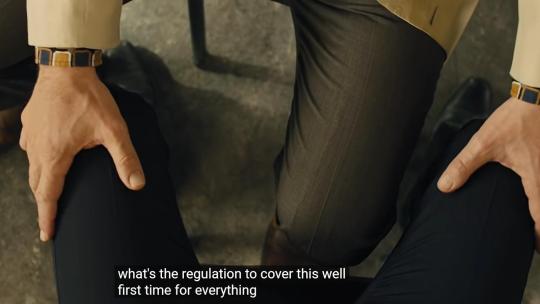
Was it the fact that he was being threatened, or the fact that James’ next line is: “what makes you think this is my first time?”
Some thoughts added by @mimsyaf are around the idea of safety in how a lot of cis women might relate to this narrative through Daniel’s eyes. He’s not a woman, he has – societally – more power than a girl or woman would have, which makes this a different watch to, say, if Danielle were to go through the same narrative. Daniel doesn’t carry that baggage of rape culture, or of the male gaze that you might find in a similar scenario of Buffy the Vampire Slayer or Christine in Phantom of the Opera (and once more the age differences between these characters and the men who love/lust over them are substantial), which makes the narrative “safer” to engage with.
I agree with that, although as a transmasc person I also come at it differently. I specifically like to headcanon Daniel as a trans guy and find his fraught interactions with masculinity through his own non-toxic lens relatable, as well as the way other boys and men react to it – also I think Terry Silver is hot. I know there are people who write Terry Silver with female OCs, which is also a form of empowerment.
On the flipside putting Daniel in this space runs a risk of fetishising him as a queer youth who is either Innocent and Pure, or a bisexual stereotype that deserves to be assaulted for not being a real man. After all, Real Straight Men don’t run the risk of sexual assault.
Alas, the road to empowerment never did run smooth.
The comparisons between the way Daniel is treated by the text and how female characters are often treated in texts are undoubtedly there. Through Ralph Macchio and TIG’s casting and the direction and acting, but also within the text itself.
It might not be with the same purpose as Neo’s symbolically trans journey, but it puts the whole narrative that Daniel’s going through from TKK1 under a different light than if there had only been one movie that ended on a triumphant sports win and a girlfriend.
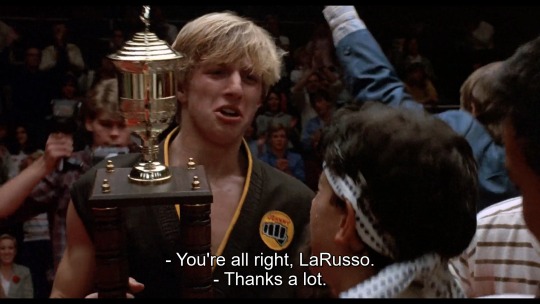
Johnny’s masculinity and the use of tears as liberation, now that’s a whole other analysis….
#daniel larusso#terry silver#the karate kid part three#the karate kid#cobra kai#ck#cobra kai meta#part two of three#we're going into labyrinth and james bond in this one fellas#(non-gendered fellas)
102 notes
·
View notes